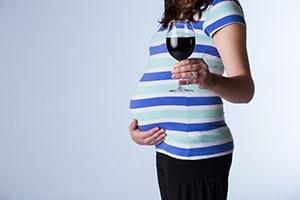Help Center
Online Resource Center for Information on Birth Injuries.

One of the first things you hear from doctors when you get pregnant is to immediately cut out all alcohol from your diet. You may be wondering, is it really necessary to stop drinking completely during pregnancy? Is one glass going to cause harm? The answer to both questions is an unequivocal yes. (This includes marijuana, including medical marijuana.) Even small amounts of alcohol have the ability to cause your child to be born with permanent physical and mental disabilities[4]. The more alcohol you drink during pregnancy, the more likely these impairments will be severe1.
Conditions that are caused by alcohol consumption in the womb are referred to as Fetal Alcohol Spectrum Disorders (FASD), with the most well-known conditions being Fetal Alcohol Syndrome (FAS) and Fetal Alcohol Effects (FAE).
Preventing your child from FAS or FAE is vital in order to give them the best possible quality of life. Children affected by these conditions often face stigma for their condition and may be shunned by other children from lack of understanding. The mothers of these children also face extreme scrutiny, often being seen as uncaring, irresponsible, or even cruel.
Fetal Alcohol Syndrome is the most common cause for intellectual disability and its effects are permanent. Children born with FAS may need around the clock care for the rest of their life depending on how severe their disability is. There are several different effects and symptoms that originate from this syndrome:
There are also some physical symptoms presented by FAS. A child with this condition may have small eyes, a short nose, flat cheeks, and thin lips. These features may remain the same or fade over time as the child grows.
FAS can be a severe disability that requires an immense amount of care and treatment throughout a child’s life, but it is also completely preventable. Refraining from alcohol during the entire pregnancy can ensure the baby does not develop this condition. This may be harder than it sounds because, for some people, alcohol is present in almost every environment. Groups of friends tend to go out on the weekends for drinking, and many people enjoy a glass of wine or beer after a long day at work. Talking to your friends and loved ones about your pregnancy may be helpful in avoiding alcohol. You can request that they do not drink while you are around, or provide you with a non-alcoholic beverage as not to feel left out.
The data on harm to children from drugs and alcohol is all over the place. According to the National Center on Substance Abuse and Child Welfare, 15% of infants are affected by prenatal alcohol or illicit drug exposure each year. How many American children suffer from fetal alcohol syndrome? The estimates range from 1.1% to 5%. Why such a range? Fetal alcohol syndrome may be misdiagnosed 80% of the time. It is all very depressing.
There are two different categories that fall under fetal alcohol effects, known as Alcohol-Related Neurodevelopment Disorder (ARND) and Alcohol-Related Birth Defects (ARBD).
ARND refers to the intellectual and behavioral defects caused by alcohol. Impairments for ARND include learning disabilities, poor school performance, short attention span, poor judgment and impulse control, and memory problems.
ARBD refers to the physical malformations caused by alcohol. The affected organs include the skeletal system, heart, kidneys, bones, and auditory system.
Fetal alcohol syndrome occurs when the mother drinks a large amount of alcohol during her pregnancy. Mothers who drink on a regular basis or engage in binge drinking often have their children develop FAS. Fetal alcohol effects occur when only a moderate amount of alcohol was consumed during pregnancy. The actual symptoms of FAS may be more severe than FAE, but that does not mean a child with FAE does not experience detrimental lifelong effects resulting from alcohol2. Both conditions are permanent and present a wide range of developmental disabilities.
Preventing your child from developing either FAS or FAE is a relatively straight forward process. Abstaining from all alcohol guarantees your child will not be born with the condition. If you are thinking of getting pregnant or are currently trying to conceive, it’s best to stop drinking immediately in case you get pregnant and are not aware of it.
If you struggle with alcohol abuse, there are many substance abuse centers and pregnancy support groups that can help you prepare for your upcoming pregnancy3. It may be beneficial to fully complete a substance abuse treatment before trying to conceive so you will not face as many temptations to drink4. Your doctor should also have resources available to help you plan out your pregnancy and establish guidelines for other types of substances to avoid.
For more information about FAS or FAE, contact the National Organization on Fetal Alcohol Syndrome at 1-800-666-6327 or contact The SAMHSA FASD Center For Excellence at 1-866-786-7327.